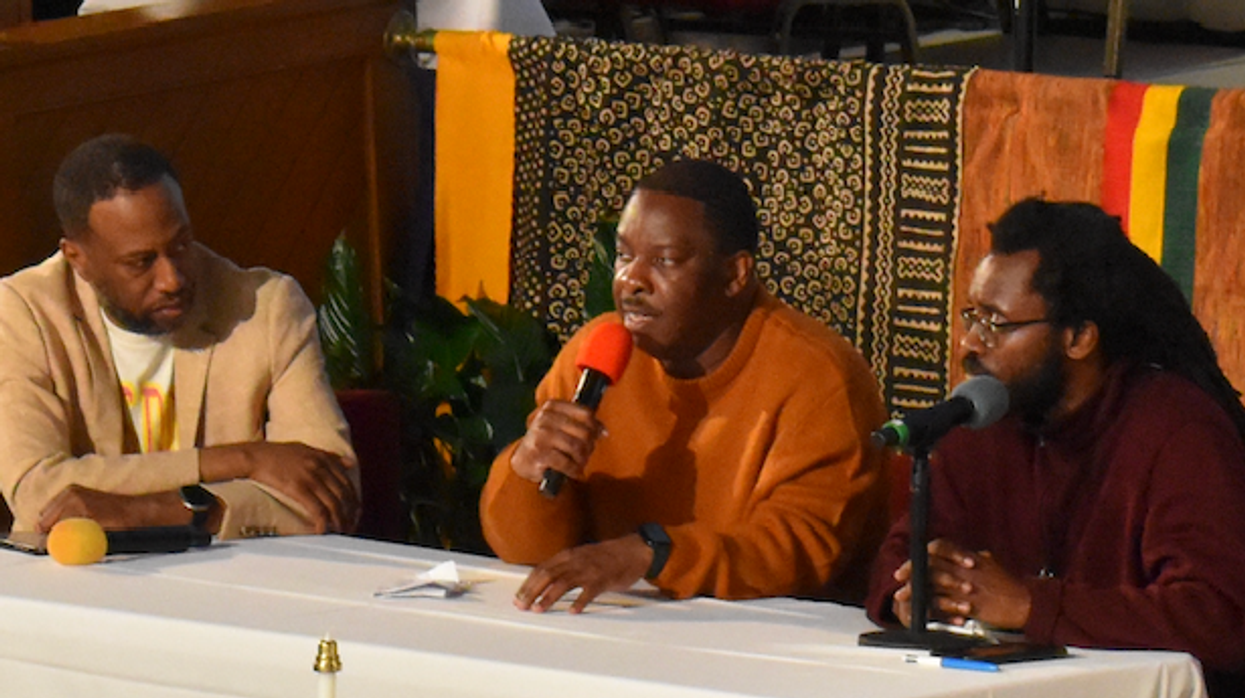WASHINGTON—Paul Osadebe still holds his job as a lawyer at the U.S. Department of Housing and Urban Development. Still, with so many of his coworkers having lost their jobs, he says it is endangering the mission of providing housing and revitalizing communities.
“They’ve tried to force so many people out that we might not be able to make sure that housing is safe. The process for people applying to housing and actually getting it so they can have a roof over their head, it takes people to make that happen, and we’re under such assault that it's very hard for us to do our jobs,” said Osadebe, who was speaking as an organizer for the Federal Unionist Network, a union.
Osadebe spoke at the Emancipation Day Speak Out on Wednesday evening to commemorate the day when slaves were freed in Washington. D.C. and voice concerns about the Trump administration’s mass firings and budget cuts in Washington at the Metropolitan AME Church in downtown Washington, D.C.
The Department of Government Efficiency, led by Elon Musk, has shrunk the 2.4 million federal workforce by what is estimated to have been hundreds of thousands of people by firing, laying off, and pushing federal employees into buyouts to “maximize governmental efficiency and productivity,” according to the White House. No official tally of the federal workforce cuts exists.
“We were told to go into [federal jobs] for security that now is subject to the whims of a billionaire who has no attachment to their realities,” said Ty-Hobson Powell, 29, a local activist.
Sam Epps, President of the Metropolitan Washington Council at the AFL-CIO, a federation of labor unions in the United States, emphasized the importance of federal workers’ job security and access to healthcare.
“This is about working people, organized or unorganized,” Epps said. “This is a huge transfer of power where you [federal workers] are.”
In addition to cutting many federal jobs in the first three months of his presidency, President Donald J. Trump signed an executive order, “Making the District of Columbia Safe and Beautiful,” in March.
“Washington, D.C., is the only city that belongs to all Americans and that all Americans can claim as theirs. As the capital city of the greatest Nation in the history of the world, it should showcase beautiful, clean, and safe public spaces,” Trump said in the executive order.
The executive order sets up a D.C. Safe and Beautiful Task Force to work closely with local officials, create joint priorities and work together to keep D.C. safe. But city officials and activists see the administration’s actions as an overstep.
“You can’t make D.C. safe and beautiful by cutting over a billion dollars from its budget,” Osadebe said.
Congress adopted a bill that would freeze funding at 2024 levels, resulting in a billion-dollar budget cut. The DC government also expected funding shortfalls because of all the federal workers who have lost jobs and will not pay the same level of taxes.
Osadebe said he sees the Trump administration’s cuts to the federal government and exertion of authority over D.C. as a testing ground for the whole country and urges workers to fight back.
“The way forward is to get organized,” Osadebe said. “If it’s you versus the administration, that’s not going to work but, if everyone who is feeling demoralized and scared or just kind of beaten down find other like minded people and take concrete steps towards defending the thing that they care about, we'll see a big enough coalition to stop all this in its tracks.”
Erin Drumm is a reporter for the Medill News Service covering politics. She graduated from the University of Notre Dame in 2024 with a BA in American Studies and is now a graduate student at Northwestern University’s Medill School of Journalism specializing in politics, policy and foreign affairs.




















Trump & Hegseth gave Mark Kelly a huge 2028 gift